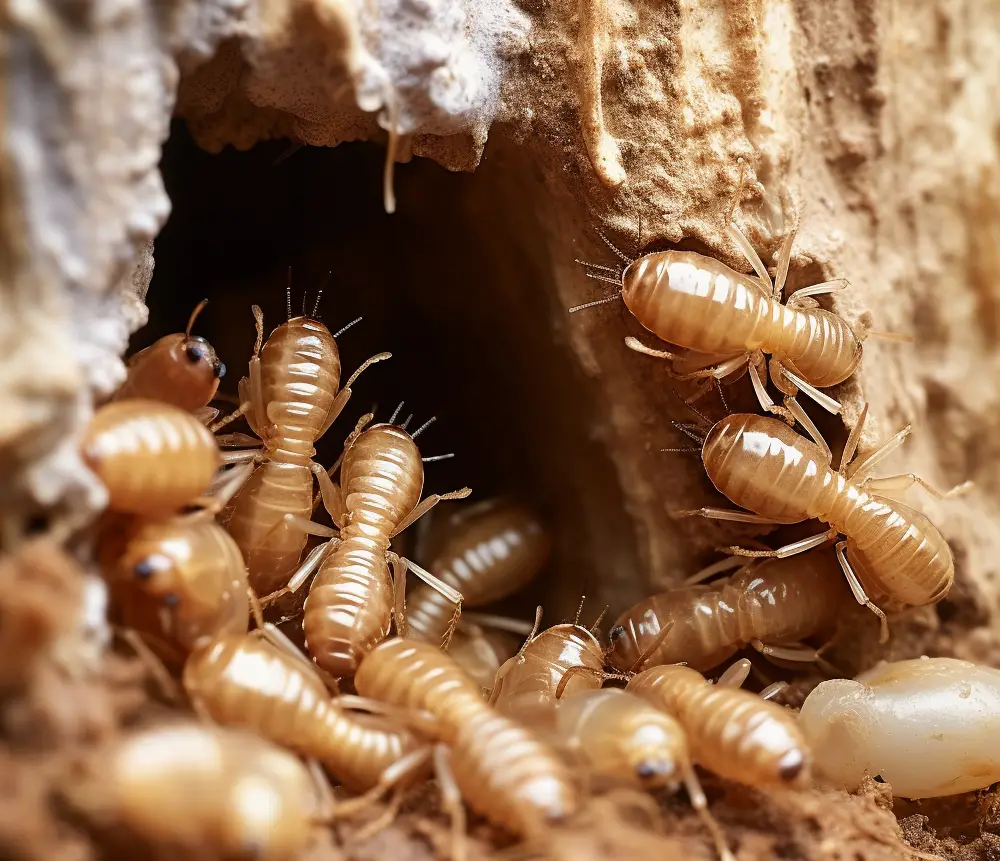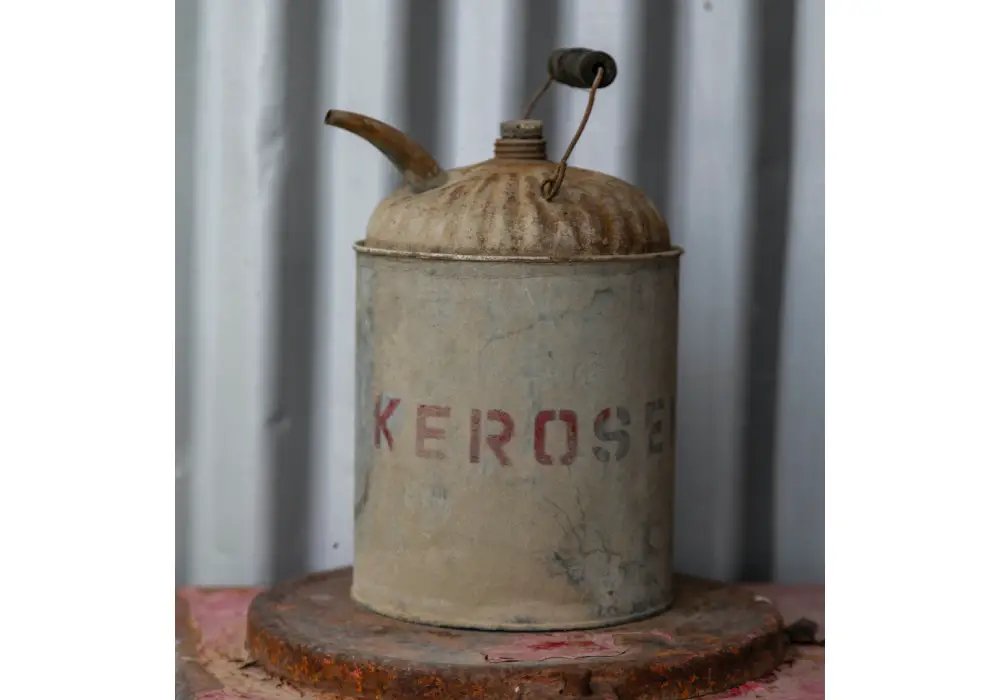Termites are a widespread problem, affecting millions of homes and causing extensive structural damage every year. Homeowners often seek out various treatment methods in order to eliminate these pests.
One such method that has been explored is the use of kerosene to kill termites.
Quick Answer:
Kerosene can kill termites on contact by breaking down their exoskeleton. However, it’s flammable and not environmentally friendly. It’s not recommended as a primary termite treatment. Professional methods are safer and more effective.
Kerosene, a petroleum-derived liquid, has been utilized in various applications, from fueling lamps to heating homes.
Understanding Termites
Termites are small, social insects that feed on cellulose found in wood and other plant materials. There are different types of termites, with the two main categories being subterranean termites and drywood termites.
Subterranean termites typically live in soil and build elaborate mud tubes to access food sources above ground. On the other hand, drywood termites live directly in wood structures and do not require contact with soil for their survival.

A termite colony is formed by a queen and a king who work together to reproduce and increase their population. As the colony grows, it divides itself into caste systems that include workers, soldiers, and winged reproductive members called alates.
Workers maintain and expand the nest, soldiers defend the colony, and alates swarm around to establish new colonies.
Termite infestations can be challenging to deal with, as they can cause extensive damage to buildings and wooden structures. Detecting a termite infestation usually involves identifying signs such as termite droppings, also known as frass and damaged wood.
Mud tubes built by subterranean termites are another clear indication of their presence. Early detection is essential for effective termite control, as it can help prevent further damage to structures.
Various termite control methods are available in the market, ranging from termite baits to chemical solutions. Termite baits are strategically placed around the perimeter of a building and work by attracting termites to consume the poison.
This approach can be slow but is environmentally friendly and has minimal impact on other living organisms. In contrast, termite killers in the form of chemicals can provide quick results but may harm other species and leave lasting effects on the environment.
Kerosene as a Termite Control Medium
Kerosene, a toxic, flammable fuel, has been utilized in some instances to address termite infestations. Its ability to penetrate wood and act as a repellent makes it a potential candidate for a termite control medium.
However, there are several factors to consider when using kerosene as a termite killer.
Kerosene’s primary function is as fuel, which means it has high flammability. This property poses a significant risk when used in a residential setting or on wood structures. Proper precautions should be taken when handling kerosene, and it is not recommended for inexperienced homeowners seeking termite control.
Unlike commercial liquid termiticides, kerosene is not specifically designed to target termites. While it can be effective as a repellent and may cause harm to termites, it lacks the necessary active ingredients that make it an ideal termite control solution.
A more efficient alternative is a product like Termidor Foam, which is specifically designed to eliminate termites.
The active ingredient in Termidor Foam is engineered to be lethal to termites upon contact, effectively terminating entire colonies. This approach is preferred in most situations, as it minimizes the risk of structural damage and is less hazardous to humans and the environment.
Risks and Safety Measures
Kerosene, a chemical compound, can kill termites when used correctly. However, using it comes with some risks and safety measures that should be considered.
To ensure the safe use of kerosene in termite treatment, it is essential to follow all necessary precautions, as improper use can result in harm to humans, pets, and the environment.
Firstly, kerosene is a flammable substance, and it should be stored and used with extreme caution to avoid fire hazards. Never use open flames or smoke near areas treated with kerosene.
Kerosene has a strong odor and can release toxic fumes when used indoors. Inhalation of these fumes can cause respiratory issues and other health problems.
If it becomes necessary to use kerosene indoors, ensure proper ventilation and consider using a respirator. To reduce potential inhalation, it is advisable to apply the pesticide in well-ventilated areas.
Handling kerosene without proper protection can lead to skin irritation and other health concerns. Wearing safety gloves and protective clothing during the application process minimizes direct contact with the chemical. Eye protection is also important to prevent any accidental splashes into the eyes.
Though kerosene has low toxicity compared to other chemical treatments, it can still be harmful if ingested or absorbed through the skin. If accidental exposure occurs, follow the guidelines set by the Environmental Protection Agency (EPA) for pesticide poison control, and consult a medical professional immediately.
Professional Pest Control Services

Professional pest control services are highly recommended when dealing with termite infestations. They have the tools, skills, and expertise to quickly assess and treat your termite problem.
Well-known companies like Orkin and Terminix provide specialized termite treatments, which include chemical applications such as Taurus SC and effective baiting systems. These treatments target termites specifically, reducing the chances of damaging other beneficial insects or the environment.
One significant advantage of using professional pest control services is their ability to perform regular inspections.
These inspections ensure that termite infestations are caught early, minimizing the damage to your home or property. In addition, they provide ongoing prevention methods, safeguarding your property from future infestations.
Alternative Solutions to Termite Infestation
When dealing with termite infestations, there is a range of alternative solutions to consider. Some of the popular methods include natural remedies, baits, insecticides, and even beneficial bacteria.

Natural Remedies: The use of vinegar, diatomaceous earth, essential oils, neem, orange oil, and boric acid are some of the many options available as natural remedies.
Vinegar can be used as a spray solution to eliminate termites on contact. Diatomaceous earth, on the other hand, is excellent at damaging the exoskeleton and dehydrating termites. Essential oils, such as neem and orange oil, contain properties that are toxic to termites, making them effective for controlling infestations.
Baits and Insecticides: Chemical treatments, including fipronil, hexaflumuron, and imidacloprid, are widely used in baits and insecticides. These chemicals disrupt the termites’ central nervous system, causing them to be unable to consume food, eventually leading to their death.
Baits can be strategically placed around the home to attract and eliminate termites without using excessive amounts of insecticides.
Beneficial Nematodes: Nematodes are microscopic, worm-like organisms that act as natural predators of termites.
These beneficial nematodes can be introduced into the soil surrounding the infested area, where they will penetrate the termites’ bodies, releasing bacteria that ultimately cause the termites’ death. This method is particularly useful as it specifically targets termites without harming the environment or other plants and creatures.
Effects on Residential Areas
Kerosene, a commonly used fuel, has been known for its effectiveness in eliminating termites from residential areas.
Termites usually infest walls, wooden structures, furniture, and hollow wood, causing significant damage and compromising the structural integrity of homes.
As termites primarily feed on wood debris and operate underground, using kerosene to target soil around affected areas helps control their population. Soil drenching with diluted kerosene can create a barrier that prevents termites from reaching the wooden structures in the house.
However, it’s essential to take safety precautions when using kerosene. Since it’s a highly flammable substance, using it near firewood or in areas prone to fire hazards should be done with extreme caution.
Additionally, it’s crucial to note that kerosene affects termites’ nervous systems, which means that its impact might not be immediate. As the termites come into contact with the kerosene, their movement might slow down, and eventually, they die.
Preventive Measures and Maintenance
Regular maintenance and preventive measures are essential in protecting your home from termites, as termites can cause extensive damage to wooden structures. There are several DIY methods and physical barriers you can implement to help keep termites away from your property.
One essential preventive step is to maintain cleanliness in your home and surroundings. Keep wood piles, debris, and other potential food sources away from your house. Store firewood and lumber at a distance, in a covered area, and elevate them off the ground to reduce termite attraction.
Another useful preventive measure is installing physical barriers. One such example is using sand as a termite barrier. Termites find it challenging to tunnel through sand with specific grain sizes. A layer of sand around your home’s foundation can deter them from accessing your property.
Another effective barrier is a stainless steel mesh installed around your house’s foundation. This mesh serves as a physical barrier that termites cannot penetrate. Termites cannot chew or fit through the small openings of the mesh, which effectively prevents them from entering your home.
Frequent inspections of your property are necessary to ensure you catch any signs of termites early. Check for signs like discarded wings, mud tubes on walls, and damaged wood. Regularly inspect the exterior and interior of your house, focusing on areas where wood meets the ground or is close to moisture.
Children should also be educated about the dangers of termite infestations and how they impact the home. Teach them the importance of keeping their living spaces clean and dry, and encourage them to report any suspicious signs of termites to an adult for further investigation.


